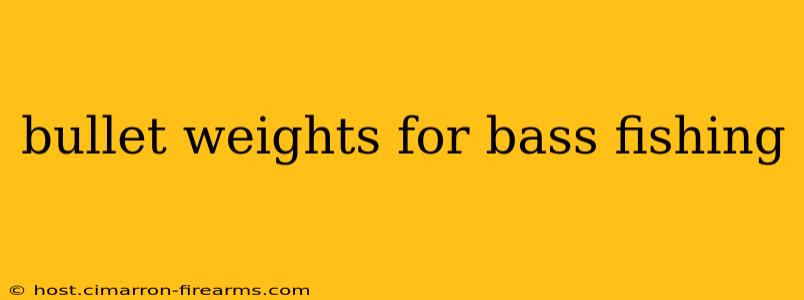Choosing the right bullet weight for bass fishing can significantly impact your success. It's not just about finding a weight that gets your lure to the bottom; it's about understanding how weight affects your presentation, targeting specific fish, and conquering various fishing conditions. This guide dives deep into the nuances of bullet weight selection, helping you make informed decisions on the water.
Understanding Bullet Weight's Impact on Your Rig
The weight of your bullet sinker directly influences several crucial aspects of your bass fishing setup:
-
Casting Distance: Heavier weights allow for longer casts, particularly useful when targeting fish in open water or across wider stretches of water. This increased distance can open up new fishing areas and allow you to cover more water in less time.
-
Depth Control: Heavier weights sink faster and allow you to reach deeper water columns more quickly. This is crucial for targeting bass holding deep in structure, near drop-offs, or in submerged vegetation. Conversely, lighter weights allow for a slower, more subtle presentation closer to the surface.
-
Lure Presentation: The weight of your bullet sinker impacts how your lure moves through the water. A heavier weight will result in a faster, more aggressive fall, while a lighter weight creates a slower, more enticing descent, ideal for triggering subtle bites.
-
Line Control: Heavier weights provide more control over your line, making it easier to manage your lure, especially in windy conditions or currents.
-
Sensitivity: While heavier weights offer better control, they can sometimes reduce the sensitivity of your setup, making it harder to detect subtle bites. Lighter weights improve sensitivity but are less effective in deeper water or strong currents.
Choosing the Right Bullet Weight: Factors to Consider
Several factors influence the optimal bullet weight for your bass fishing needs:
1. Water Depth:
-
Shallow Water (Less than 10 feet): Lighter weights (1/8 oz - 1/4 oz) are generally sufficient, allowing for a more natural lure presentation.
-
Medium Depth (10-20 feet): Weights between 1/4 oz and 3/8 oz are commonly used, providing a balance between casting distance and sensitivity.
-
Deep Water (Over 20 feet): Heavier weights (3/8 oz - 1 oz or even heavier) are necessary to effectively reach the desired depth and maintain line control.
2. Water Current:
Strong currents require heavier weights to keep your lure in the strike zone. Lighter weights may get swept away, rendering your presentation ineffective.
3. Cover Type:
-
Open Water: Heavier weights allow for longer casts to cover more ground.
-
Weed Beds: Heavier weights are sometimes needed to penetrate thick vegetation; however, lighter weights allow for a more precise presentation through sparse weeds.
-
Rocks and Structure: Heavier weights help to keep your lure close to the bottom, while lighter weights can help avoid snags.
4. Lure Type:
Different lures require different weights. Lighter lures typically require lighter weights, while heavier lures can handle heavier weights. Experimentation is key to finding the ideal balance.
5. Bass Behavior:
Highly active bass might respond well to a more aggressively presented lure (heavier weight), while less active bass may prefer a slower, more subtle presentation (lighter weight).
Experimentation is Key
The best way to determine the ideal bullet weight is through experimentation. Start with a weight you believe is appropriate based on the factors discussed above, and then adjust as needed based on your observations. Pay attention to how your lure behaves, how often you're getting bites, and how effectively you're covering your target area.
Conclusion: Mastering Bullet Weight Selection
Mastering the art of bullet weight selection isn't just about understanding the numbers; it's about understanding the intricate relationship between weight, water conditions, lure presentation, and bass behavior. By carefully considering these factors and through diligent experimentation, you can significantly improve your bass fishing success rate. Remember, the perfect bullet weight isn't a one-size-fits-all solution; it's a variable you must adapt to optimize your fishing experience.

